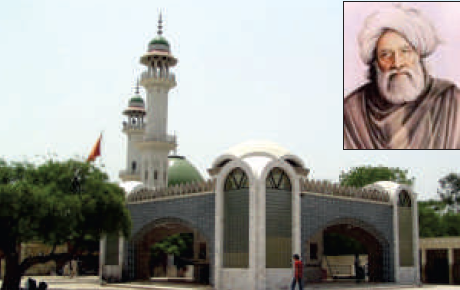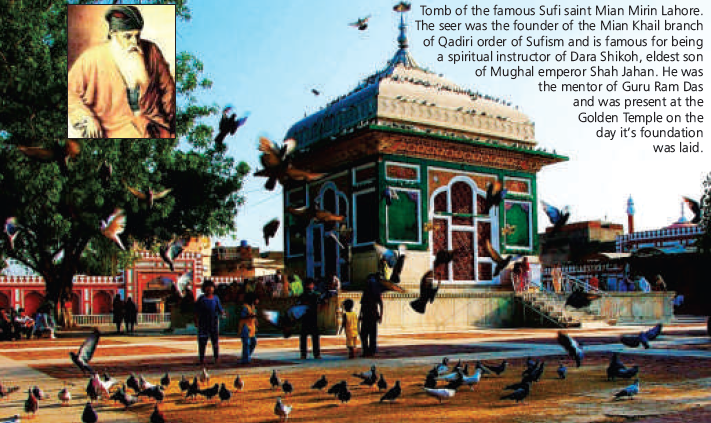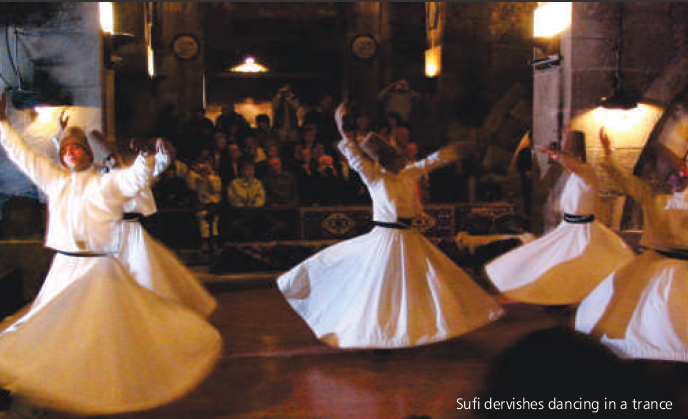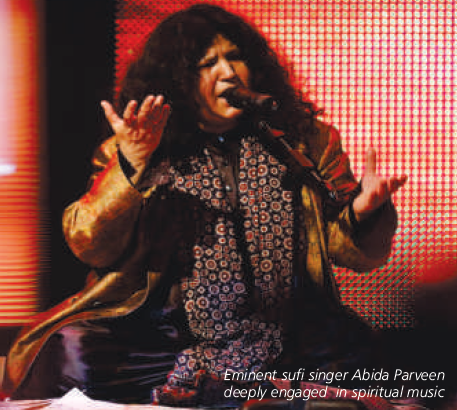Sufi poetry (Sufiyana Kalaam)
(→Bulleh in 21st century popular music) |
|||
| Line 11: | Line 11: | ||
[[Category: India |S]] | [[Category: India |S]] | ||
[[Category: History |S]] | [[Category: History |S]] | ||
| − | [[Category: | + | [[Category:Religion|Alphabet]] |
| − | [[Category: | + | [[Category:Literature|Alphabet]] |
=Sufism in the Punjab= | =Sufism in the Punjab= | ||
Revision as of 20:21, 11 January 2014
This is a collection of articles archived for the excellence of their content. Readers will be able to edit existing articles and post new articles directly |
Contents |
Sufism in the Punjab
Ranjha ranjha kardi hun main aape Ranjha hoyi
India Harmony Volume - 1 : Issue - 2, 2013
Sufiyana Kalaam captures popular imagination
Sufism, the inner, mystical, or psychospiritual dimension of Islam with its emphasis on equity, humanism and universal brotherhood has become uber cool in current times.
Bulleh in 21st century popular music
In 2004, popular Punjabi singer Rabbi Shergill's rendition of the abstract metaphysical composition of Bulleh Shah, Bullah ki Jaana became a raging hit in India and Pakistan
Bulleh Shah's composition again appeared in the song Bandeya Ho in the 2007 Pakistani film Khuda ke liye. The 2008 Indian movie A Wednesday, written and directed by Neeraj Pandey, had a song, Bulleh Shah, O yaar mere in its soundtrack. Bulleh Shah's composition was rewritten in this film by Irshad Kamil In the movie Raavan (2010), Gulzar used Bulleh Shah's 'Ranjha Ranjha' in one of the songs. In 2009, Episode One of Pakistan's Coke Studio Season 2 featured collaboration between Sain Zahoor and Noori, and as a result, Bulleh Shah's Aik Alif became immensely popular.
A R Rehman's Khwaja mere Khwaja and Kailash Kher's Allah ke Bandhe too have made an impact.
Sufi pop
Several singers of the subcontinent including the legendary Nusrat Fateh Ali khan, Abida Parveen and youngsters like Rahat Fateh Ali Khan, Zila Khan, Wadali Brothers and sufi rock bands like Junoon and Mekaal Hasan have brought the rich spirituality of sufi poetry to contemporary audiences.
Seeking through poetry
The Sufi tradition of seeking spiritual salvation, searching for the meaning of life and for God, are beautifully expressed through their poetry. Who is the Creator? What is the truth? What is the meaning of life? How can one find God? Who am I? These are some of the universal truths that the Sufis have tried to answer by disassociating themselves from worldly knowledge and deeds, and moving onto a spiritual sphere, where they are no longer bound by traditionally interpreted religious or material restrictions.
Syed Bulleh Shah (1680-1758)
It is just such a search that has been exquisitely portrayed by Syed Bulleh Shah (1680-1758) in the song 'Bullah ki jaana mein kaun'.
He, later shifted to another village- Pando kee Bhattiyyan in Qasur district. On his death, the Maulvis did not allow him to be buried in the community graveyard because of his unorthodox beliefs. Bulleh Shah is today known globally as the greatest Sufi poet of Punjab; the rich and the influential, the very class which had rejected him once, today compete with each other to be buried near his grave at Qasur (near Lahore).
This poem by Bulleh Shah typifies a spirituality that speaks of intense fervour towards God while at the same time advocating a deep human brotherhood.
If God was found by bathing and cleansing He would have been found by frogs and fish If God was found by wandering in the jungles Stray animals would have found him O Bulleh, the Lord can only be found By loving hearts – true and pure…
The Way of the Sufis in India
The Sufis came from Central Asia and the Middle East around the time the first Muslim conquerors came to India. They brought with them an unorthodox and iconoclastic form of spirituality that approached universal faith with liberal teachings and immense tolerance. The core teaching was of secularism and a simple message of the oneness of God. In the era of globalisation, the Sufis' ersatz poetry has a universal appeal.
Sufism, provides rich resources for developing theologies of inter-faith dialogue and solidarity, an urgent necessity in today's world where talk of a global 'clash of civilisations' threatens to become a frightening reality. In this regard, the works of numerous Indian Sufis is particularly significant because they lived and wrote in a multi-religious context, addressing and attracting people of different faiths—Muslims, Hindus and others. Some of them developed understanding of different faiths, besides islam, that went beyond narrowly constructed communal boundaries, defying the empty and soulless ritualism that served to divide communities from each other.
The sufis' God madness and the intense desire to be one with God often had them singing and dancing themselves into a trance. Singers like Nusrat Fateh Ali Khan are able to take the audiences to the rapturous heights of spirituality through their qawwal and sufi singing. Abida Parveen too is able to combine masti (frenzy) with meditative intimacy.
The spirit of Sufism found a ready congruence in Vedanta and in the Indian "Sant tradition." The intense passion for union with God and the pangs of separation of the sufis was akin to the Vaishnavism and surrender to the Divine. At the same time, the concept of oneness of the soul and the Divine was in accordance with the Hindu Advaita philosophy. The most successful blending of the Indo-Aryan Sanatana-Dharma and the Arabic-Persian Islamic mysticism is a peculiarly Indian product that germinated and flowered in undivided Punjab. Also, there is a satisfying congruence between Sikh and Sufi perspectives.
Sheikh Farid-ud-Din Ganj-i-Shakr [1173-1265]
A pre-eminent exponent of Sufism in India was Sheikh Farid [1173-1265]. It is said that Baba Farid, as a young boy, was taught prayers by his mother. When the young lad asked her what would be gained from prayers, she replied that he would get sugar cubes every time he said his prayers. The sugar cubes were hidden under the prayer carpet and given to the lad every times he finished his prayers. One day, when Bibi Miriam forgot to put the sugar cubes in place, much to her surprise, there were cubes beneath the carpet after prayers. Bibi Mariam started calling her son Shakar Ganj, or, the treasury of sugar.
Shaikh Farid-ud-Din Ganj-i-Shakr, popularly known as Baba Farid played an important role in transforming the religious, linguistic and cultural ethos of the land.
Guru Nanak
Two centuries later Guru Nanak was born when a new composite culture and vitally transformed language had evolved in the soil.
In Sikh religious history, Sufism had an important role to play. The compilation of the Guru Granth Sahib is the core event of Punjabi literary and religious history. The best compilation of Nirguna Bhagats like Baba Farid and Namdev are contained in it. Guru Nanak, who was born in April, 1469( i.e. 204 years after the death of Baba Farid), had gone to Ajodhan to meet Shaikh Brahm or Shaikh Farid Sani, who was in the line of succession of the Faridi order of Chishti Silsilah to collect hymns of Baba Farid, which were later on incorporated in the Guru Granth Sahib by Guru Arjan Dev in 1604. Baba Farid laid emphasis on human values and tolerance.
During Baba Farid's time and thereafter there were cordial relations between Hindus and Muslims. Guru Nanak's message was like that of the Sufis in as far as it was meant both for Hindus and Muslims.
The oneness of God
Mystic prose propagating the oneness of God and love of humanity has flowed from the Baani of the Sikh Gurus and the Qalaams of the Sufi saints like Mian Mir, Baba Fareed Ganjshakar, Baba Bulleh Shah, Hazrat Shah Hussein and Sultan Bahu. The mystical songs of these seers, in particular, are the pride of the whole of Punjab and form a common and invaluable heritage for humanity.
Their Sufi kalaams and poetry are a pleasure to read and to relish the beauty of the Punjabi language. Punjabi Sufi poets have used characters and situations from the love legends 'Heer -Ranjha, Mirza -Sahiban, Sohni-Mahiwal, Sassi-Pannu etc to make, amongst others, two of their central points: The love of humankind (and god) and rebellion against the established social and religious norms.
Qissa poetry
(Qissa== story or anecdote)
'Qissa poetry', the ballad poems of Islamic- Punjabi, became popular among both Sufi storytellers and the Gurmukhi musicians, who believed in “ishq” (love) both in life and in commune with God. Thus Heer's longing for Dhido Ranjha becomes an allegory for the sufi's yearning to be united with 'God'. In this verse that has become immensely popular, Bulleh Shah expresses his yearning for the union with the Almighty.
Ranjha Ranjha
Ranjha ranjha kardi hun main aape Ranjha hoyi
Saddo mainoon Dheedo Ranjha, Heer naa akho koyi
Ranjha main wich, main Ranjhe wich, ghair khayyal na koyi
Main naheen au aap hai, apni aap kare diljoyi
Jo kuch saade andar wasse, zaat assadi soyi
Jis de naal main neoonh lagaya oho jaisi hoyi
Chitti chaadar laa sut kuriye, pehan faqeeran loyi
Chitti chaadar daag lagesi, loyii daag na koyi
Taqt hazaare lai chal Bulleah, siyaaleen mile na dhoyi
Ranjha ranjha kardi hun main aape Ranjha hoyi
Remembering Ranjha day and night,
I've become Ranjha myself.
Call me Dhido Ranjha,
No more I be addressed as Heer,
I abuse Ranjha but adore him in my heart.
Ranjha and Heer are a single soul,
No one could ever set them apart
Sheikh Farid-ud-din, was the first Sufi poet who "sang of his insatiable hunger for the love of the Lord in works of immortal beauty". In an age marked by great brutality, he brought the touch of humanity and fellow feeling to all. Farid was also the first poet of Punjab and Punjabi who used the symbol of human relationship between wife and husband to express his longings for union with the Divine. The kafis (lyrics) of Shah Husain (1538- 1599), the popular romantic Sufi saint of Lahore added to Sufi poetry its peculiar element of masti (rapture) and introduced enraptured dancing and passionate signing. Hussain was also the first Sufi poet of Punjabi who adopted the popular measure of Kafi to express his mystic ideas. The credit for introducing the element of the popular lovelegends of Punjab (Heer Ranjha and Sohni Mahiwal) to Sufi Verse and utilizing their persons, places, motifs and incidents as images, metaphors and allegories etc. also goes to him.
Although there are several qissakars who have retold the love legends, it is Waris Shah's Hir, Pilu's Mirza versified in the seventeenth century, Hashim Shah's Sassi and Fazal Shah's Soni that are the most popular.
Waris Shah
Waris Shah's version of Heer Ranjha is the most celebrated of the qissas or legends of Punjab. The qissas are in chaste Punjabi and are open-ended. The lover rebels are characterised as the archetypal patterns of Punjabi behaviour' as they reveal most vividly, the ideals of honesty, loyalty, steadfastness and courage. They signify the synthesis of love and suffering for the highest ideals, both spiritual and societal. Such is the popularity of Heer that she finds mention in the poetry of Bhai Gurudas and Guru Gobind Singh. Also, Udham Singh, who killed General O Dwyer in the run up to India's independence from British rule, declared his name as Ram Mohammad Singh to show the unity of all three religions and also took oath on a book of Heer Ranjha written by Waris Shah.
Waris Shah's creativity and his penning his version of Heer came out of intense frustration over the bitter realities of life, the cruelty of the ruling class and the hypocrisy of the clergy. He was derisive of the clergy and presented Ranjha as an embodiment of universal loneliness that resides in every lover's soul. Major poets of Punjab have, been deeply influenced by Sufism.
Non-Muslim mystic poets
Its influence on the non-Muslim mystic poets of the first half of the twentieth century viz. Sant Rein, Sadhu Daya Singh, Paul Singh Arif, Man Singh Kalidas and Kishan Singh Arif is quite evident. Even the poets of the modern period, including Bhai Vir Singh (1872-1957), the father of modern Punjabi literature, have also imbibed its impact.




